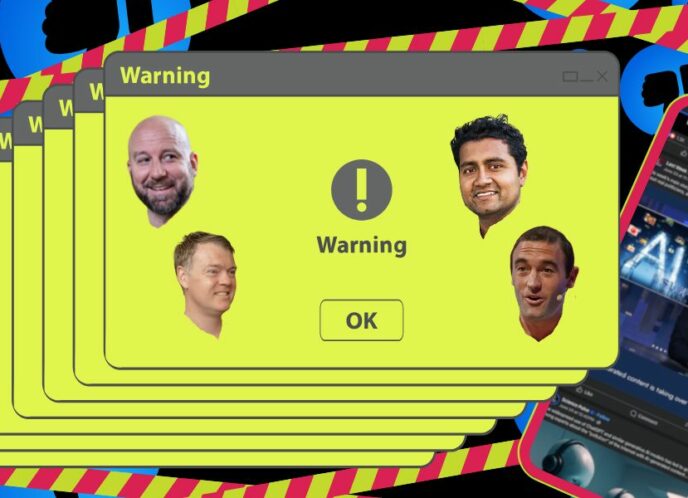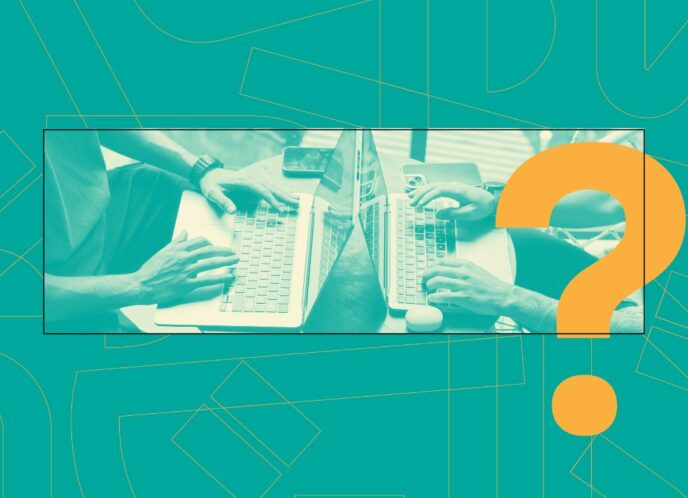Before we can fight for media justice, we must ground ourselves in a common understanding of our struggle. This spring, MediaJustice hosted a series of workshops that broke down important issues, including racialized disinformation, e-carceration, protecting Black dissent, digital security, and movement building. Explore the videos and related resources below to learn more about the fight to get our communities connected, represented, and free. (La versión en español)
HOLDING SPACE WITH WHITE TEXT
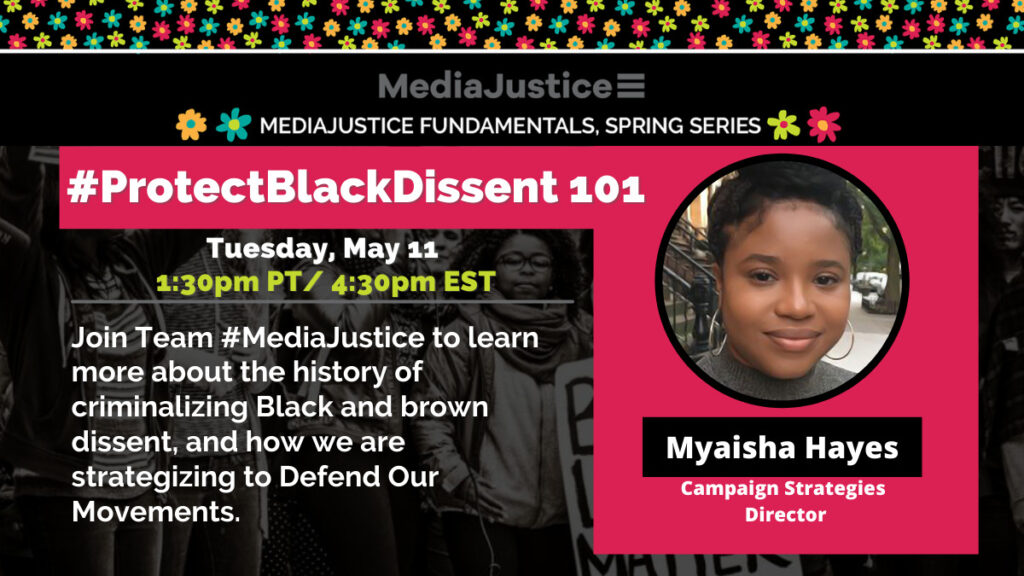
#ProtectBlackDissent 101, facilitated by Myaisha Hayes, Campaign Strategies Director at MediaJustice. Participants learned about the history of criminalizing Black and brown dissent, the work MediaJustice has done to ProtectBlackDissent, and how we are strategizing to Defend our Movements. Click here to watch the recording. Want to learn more? Check out these related resources:
- Advocacy Campaign
- Articles
- Timelines
- Videos
- Explainers
THIS TEXT IS HOLDING SPACE
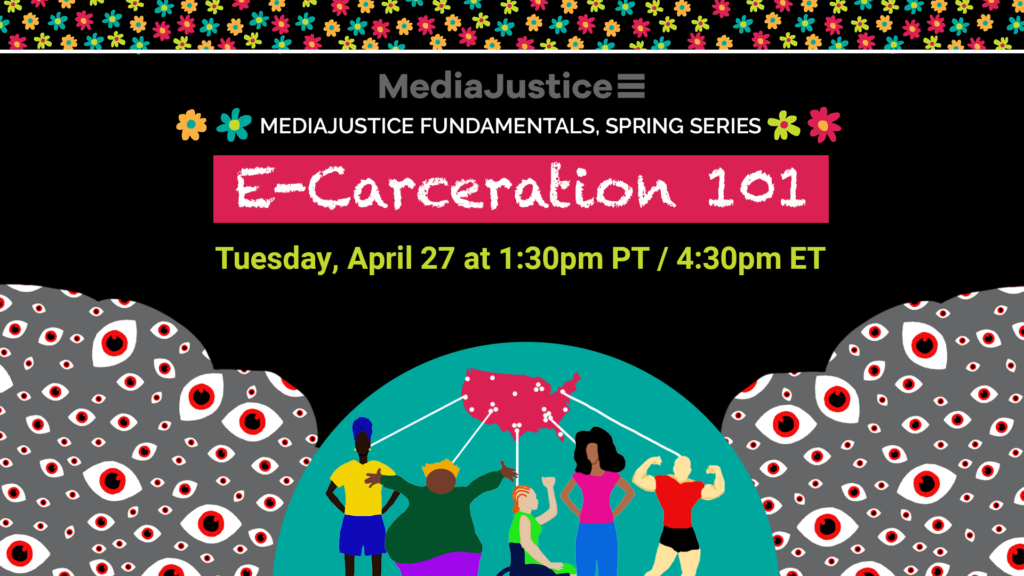
E-Carceration 101, facilitated by James Kilgore, Media Fellow at MediaJustice. This session drew on the work of MediaJustice’s Challenging E-Carceration project and our engagement with impacted individuals. In this workshop, we will describe how electronic monitoring functions on a daily basis, why it represents an alternative form of incarceration, and how we can struggle for more transformative options in the fight for abolition. Click here to watch the recording. Want to learn more? Check out these related resources:
THIS IS TEXT TO CREATE PADDING
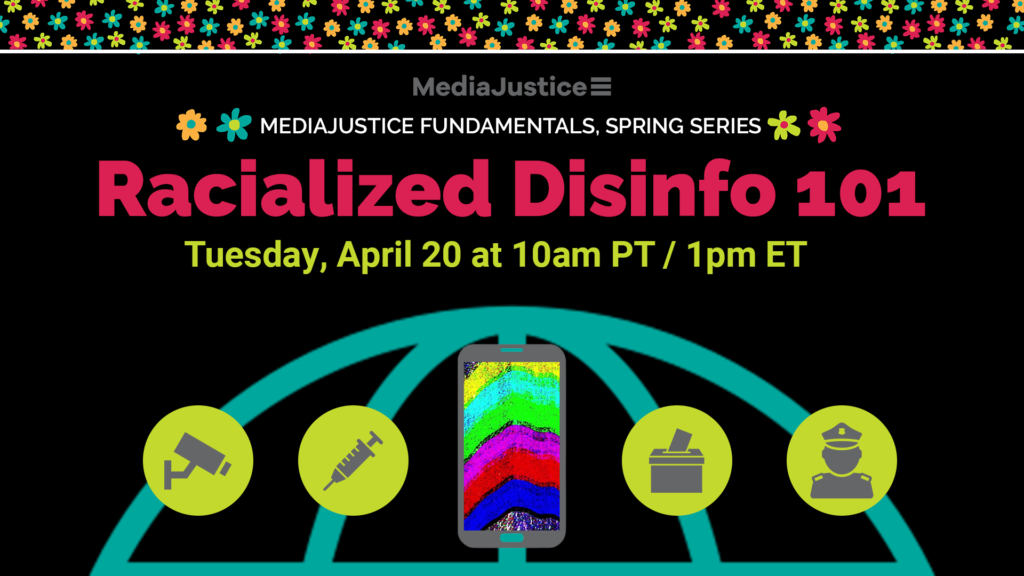
Racialized Disinfo 101, facilitated by Erin Shields, National Field Organizer at MediaJustice. Join us for a workshop on the history of racialized disinformation in the U.S. and how this impacts our approach to fighting disinfo in our own communities today. Click here to watch the recording. Want to learn more? Check out these related resources:
- MISINFORMATION– Information whose inaccuracy is unintentional, and spread unknowingly.
- DISINFORMATION– Information that is deliberately false or misleading, often spread for political gain, profit, or to discredit a target individual, group, movement, or political party.
- RACIALIZED DISINFORMATION– Racialized disinformation campaigns employ the strategic use of falsified racial or ethnic identities and/or focus on race as a wedge issue.
- Yellow Journalism
- Racialized Disinfo in Practice:
- COINTELPRO
- #yourSLIPIsSHOWING
- BLAXIT
- Dr. Joan Donovan, The Media Manipulation Casebook
- Freedom Archives
- Center for Study of Political Graphics
- First Draft
THIS TEXT IS HOLDING SPACE
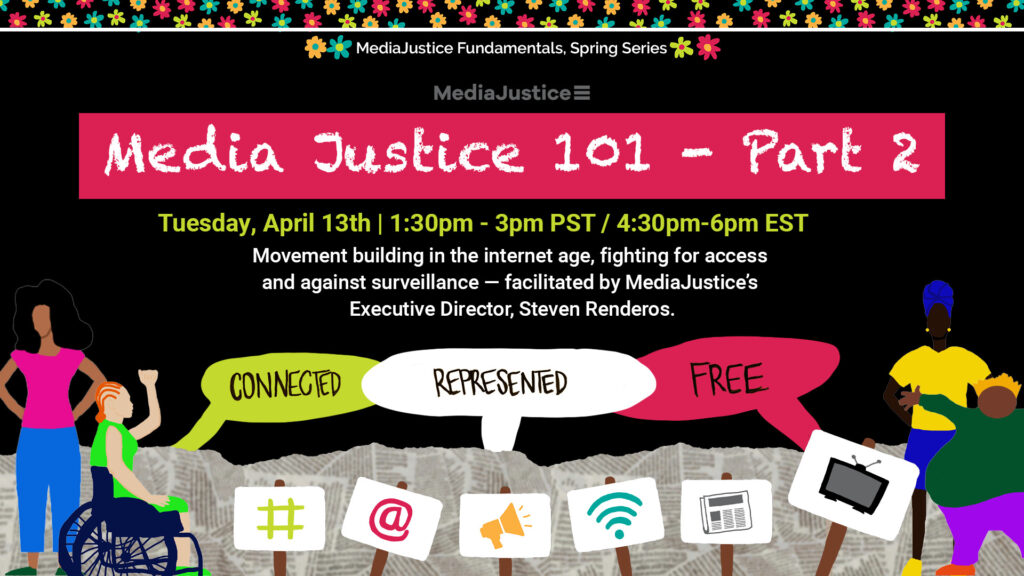
Media Justice 101 Part 2, facilitated by Steven Renderos, Executive Director at MediaJustice. At the turn of the 21st century, a new movement dubbed Media Justice was formed. At the time, media activists were fighting the consolidation of media from giant corporations like Viacom, Disney and Clear Channel. In the span of a decade, these media giants would be surpassed by a new class of monopoly power, Silicon Valley. These new tech giants rely on a business model centered on collecting every bit of data they can about you. This data has been used to target ads, fuel racists algorithms, and build powerful surveillance tools like facial recognition software. Racial disparities our communities face offline in policing, education, housing, etc are shifting online. Join us to learn how the MediaJustice movement has evolved beyond media representation to challenge the technological giants that are shaping communication in our world today. Come discuss movement building in the internet age, as we continue to fight for access and against surveillance. Click here to watch the recording. Want to learn more? Check out these related resources:
- Community: A set of people who share a common experience, geography, identity, practice, and/or values.
- Media: A vehicle to communicate to lots of people
- Media Consolidation: a process whereby progressively fewer individuals or organizations control increasing shares of the mass media.
- Deregulation: Deregulation is the reduction or elimination of government power in a particular industry.
- Media Justice: Media Justice exists when fundamental communication rights are widely experienced by everyone. When media and technology close gaps in power, privilege, and position. We know, because history is a teacher, that cultural change drives political change. We, the criminalized, the scapegoated, and stereotyped, envision sustained and universal access to open, democratic and representative media and technology platforms. Only then can news and popular culture bring about a new reality of racial, economic, and gender justice. This is a vision worth fighting for.
- Agitarte Cultural Works’ thread on Cultural Hegemony
- They Were Children: Confronting the Superpredator Myth
WHITE TEXT

Media Justice 101 Part 1, facilitated by Steven Renderos, Executive Director at MediaJustice. Media in the United States has played a key role in shaping the cultural and political conditions affecting people of color. Since the publication of the very first newspaper, the Publick Occurrence in the late 1600s, Black people, indigenous communities and other communities of color have struggled to shape our own media representation. At every moment of innovation, from newspapers, radio, to TV, media activists have waged a struggle to control our stories. As the first Black newspaper, Freedom’s Journal wrote in 1827, “We wish to plead our own cause…far too long have others spoken for us.” It’s a rallying cry as relevant today as it was in the 19th century. Join us to learn about the history media resistance led by people of color, from the free press to free TV, that has shaped the Media Justice movement we know today. Click here to watch the recording.

